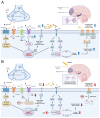Phytochemicals That Act on Synaptic Plasticity as Potential Prophylaxis against Stress-Induced Depressive Disorder
- PMID: 36694423
- PMCID: PMC9970837
- DOI: 10.4062/biomolther.2022.116
Phytochemicals That Act on Synaptic Plasticity as Potential Prophylaxis against Stress-Induced Depressive Disorder
Abstract
Depression is a neuropsychiatric disorder associated with persistent stress and disruption of neuronal function. Persistent stress causes neuronal atrophy, including loss of synapses and reduced size of the hippocampus and prefrontal cortex. These alterations are associated with neural dysfunction, including mood disturbances, cognitive impairment, and behavioral changes. Synaptic plasticity is the fundamental function of neural networks in response to various stimuli and acts by reorganizing neuronal structure, function, and connections from the molecular to the behavioral level. In this review, we describe the alterations in synaptic plasticity as underlying pathological mechanisms for depression in animal models and humans. We further elaborate on the significance of phytochemicals as bioactive agents that can positively modulate stress-induced, aberrant synaptic activity. Bioactive agents, including flavonoids, terpenes, saponins, and lignans, have been reported to upregulate brain-derived neurotrophic factor expression and release, suppress neuronal loss, and activate the relevant signaling pathways, including TrkB, ERK, Akt, and mTOR pathways, resulting in increased spine maturation and synaptic numbers in the neuronal cells and in the brains of stressed animals. In clinical trials, phytochemical usage is regarded as safe and well-tolerated for suppressing stress-related parameters in patients with depression. Thus, intake of phytochemicals with safe and active effects on synaptic plasticity may be a strategy for preventing neuronal damage and alleviating depression in a stressful life.
Keywords: Depression; Phytochemicals; Preventive agents; Stress; Synaptic plasticity.
Conflict of interest statement
The authors declare no conflict of interest.
Figures


References
-
- Anjomshoa M., Boroujeni S. N., Ghasemi S., Lorigooini Z., Amiri A., Balali-Dehkordi S., Amini-Khoei H. Rutin via increase in the CA3 diameter of the hippocampus exerted antidepressant-like effect in mouse model of maternal separation stress: possible involvement of NMDA receptors. Behav. Neurol. 2020;2020:4813616. doi: 10.1155/2020/4813616. - DOI - PMC - PubMed
-
- Bergami M., Rimondini R., Santi S., Blum R., Gotz M., Canossa M. Deletion of TrkB in adult progenitors alters newborn neuron integration into hippocampal circuits and increases anxiety-like behavior. Proc. Natl. Acad. Sci. U. S. A. 2008;105:15570–15575. doi: 10.1073/pnas.0803702105. - DOI - PMC - PubMed
-
- Bergman J., Miodownik C., Bersudsky Y., Sokolik S., Lerner P. P., Kreinin A., Polakiewicz J., Lerner V. Curcumin as an add-on to antidepressive treatment: a randomized, double-blind, placebo-controlled, pilot clinical study. Clin. Neuropharmacol. 2013;36:73–77. doi: 10.1097/WNF.0b013e31828ef969. - DOI - PubMed
Publication types
LinkOut - more resources
Full Text Sources
Miscellaneous

